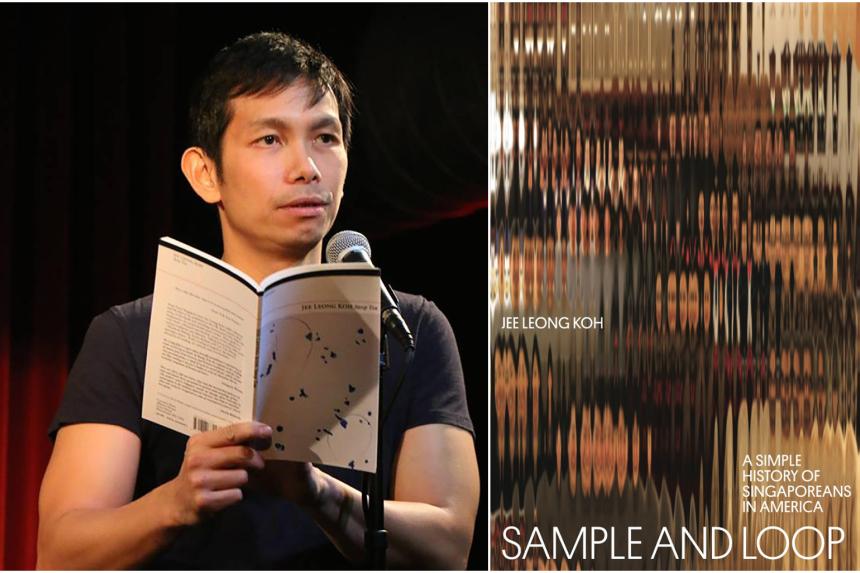Sample And Loop: A Simple History Of Singaporeans In America
By Jee Leong Koh
Poetry/Bench Press/Paperback/162 pages/$22/Word Image
4 stars
Among the most famed Singaporeans in America is perhaps Crazy Rich Asians (2013) author Kevin Kwan. He moved to Houston, Texas, at age 11, and his great-grandfather was the founding director of OCBC Bank.
In a poem about Kwan titled The Author, New York-based Singaporean writer Jee Leong Koh takes the anecdote that Kwan was inspired to write his best-selling book in 2009 when caring for his father who had cancer, and turns it into a moment of tenderness in the diaspora.
“And yet / another privilege – the clean, white pillow / grew hot under father, and he flipped it / for a cool offertory to the head. / I know he did. Last year I did the same.”
It is a reference to Koh’s recent book of poems, Inspector Inspector (2022), which dealt with the legacy of fathers, including the poet’s own.
Inspector Inspector also contains some of the poems found in Sample And Loop: A Simple History Of Singaporeans In America. But the scope of this full-length examination of Singaporeans in America draws from a much wider cast of experiences beyond parent and child.
This latest book by the Singapore Literature Prize-winning author presents a cycle of poems with titles such as The Theater Director, The Porn Star and The Philosopher. They offer a panoramic view of “all who live away from where they were born”, as the book’s dedication makes clear.
Koh had interviewed many of these Singaporeans in America, from Louisiana-born and Singapore-raised musician Phillip Cheah, to Shirkers (2018) film-maker Sandi Tan, who moved to the United States in her 20s. Many of Koh’s subjects are artists, cultural workers, queer people and counter-cultural figures.
His choices reveal he is as much wanting to tell the story of the Singaporean diaspora in America as much as he is trying to fathom his own relationship with the diaspora.
He is a founder of Singapore Unbound – a non-profit organisation that forms cultural connections between Singapore and the US – and had migrated to New York more than two decades ago.
It might well be a confession that Koh writes in one of the book’s longest poems – a 41-page sequence – titled The Dying Nurse: “I had no interest in the lives of others, / not really, but in their effect on me, / the sun striking the sea in distant diamonds.”
Many of these poems, through a kind of ethnographic and biographical method, become transmuted and sparkle in moments of insight when they distil the feelings that make up diasporic life and, perhaps, more poignantly, the forces that drive those who leave.
In The Theater Director, a poem about queer theatremaker Mei Ann Teo, Koh writes that “the change / was no decision, but discovery”. In The Architect, for Christopher Chew, Koh writes: “A twist on an old poem turned my mind, / a poem itself a twist on an old idiom– / a building should be renovated like / a nest, for chickens to come home to roost.”
The book ends with a quartet of occasional poems, which detracts from the powerful unifying concept that glues the collection together and disrupts the reading experience of a book largely committed to the slow building of biographical detail.
While many of Koh’s books of poetry display strong adherence to mastery and reinvention of form, this collection adopts a looser, uninhibited formal structure that allows the detritus of everyday life to accumulate and take shape.
His signature sensitivity for rhythm and metre propels the book forward and it swells to a climax in The Dying Nurse. Always the reinventor, Sample And Loop sees Koh create a form that feels unique and accommodates the world of diasporic feeling in its roaming, roving expansiveness.
If you like this, read: Inspector Inspector by Jee Leong Koh (Carcanet, 2022, $32.28, Amazon SG, go to amzn.to/3wMcSD5). This book contains some of Koh’s most devastating, austere poems in the sequence titled Palinodes In The Voice Of My Dead Father.

